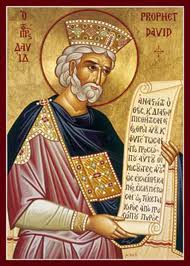
Today’s Gospel reading is taken from the Beginning of the New Testament, from the first chapter of the Gospel according to St Matthew. This reading begins with a long list of Hebrew names that give the family tree of Jesus on the human side. All in all, some 47 names are mentioned – the great, the near great, and the not so great. And it’s this long list of names which are almost impossible for us to pronounce and seem to make for a rather dull reading. Yet the first chapter of St Matthew’s Gospel is very important – so important that it is read in every Orthodox Church, every year on the Sunday before Christmas because it gives us the history of Christmas, the human story out of which Christmas came to us. All of those names are actually vivid images of living souls who prepared the way for Christmas.
Looking closer at this genealogy, one would think that Jesus would have come from a background that consisted, if not of royalty, then at least of saintly and holy persons. But what do we find in His family tree? We find sinners like ourselves. We find people who even when blessed by God, fell in times of weakness like King David. We find sinners of all kinds! An invented family tree would have been different. But yet again we see the truthfulness of the Gospel writers. They don’t lie about Jesus’ ancestry, but tell it like it is. It was from this family tree that the holiest person to walk the earth came from. He was a descendent of sinful humanity. And what this means for us is that if Jesus is to be born in your soul, if He is to become a part of our daily lives and not just someone we are acquainted with only on Sunday mornings, He is to be born into our souls in spite of the accumulation of our sins. Because He came from this family tree full of sinners we find we have something in common with Him. He is not a Creator who separates Himself from us. His family tree is our family tree. He is one of us. He has compassion for sinners who are part of His own family. And yet He rises above His ancestry.
St Matthew deliberately shatters the custom of his day by introducing into the long series of male names the names of 5 women at a time when women were simply not included in genealogies. By doing this he indicates that “in Christ there is neither male nor female”; all are equal; all are one in Christ. The 5 women are Tamar and Rahab; Ruth, a non-Jew; Bathsheba, and finally Mary, the Panagia, the Mother of Jesus. We find in the genealogy people who are constantly missing the mark. Yet out of these short comings arises a dazzling flower of purity, the Theotokos, of whom our Saviour was to be born.
So Jesus has a lot of dark spots in His ancestral history. Who doesn’t? Often we think of our ancestors whoever they may be, as noble people, even heroes of their time. We desire our ancestors to be heroes of the epanastasis or even saints. And yet everyone has a dark past somewhere in his or her ancestry. In pointing out the sinners that comprise Jesus’ ancestry, it just goes to show how much like us Jesus really is. The holy Fathers of our Church, who we may also call our ancestors, always emphasised the perfect balance between the humanity of Jesus and His divinity. Sometimes it is us who steal Christ’s humanity from Him making Him distant from us, more God than human. But more often it is the faithless society around us who robs Jesus of His divinity making Him a mere man. It is the God-man that we Orthodox Christians need to acquaint ourselves with. And there’s no better time than now before the holy feast of His birth. Acquaint yourselves with Him through the message of the Gospel. Acquaint yourselves with Him personally through Holy Communion. He knows us; He wants us to get to know Him.
We Christians can now claim a new ancestry. Jesus is the beginning of a new blood stream, a new inheritance, a higher race of people. Through our baptism we can now have the source of our blood line, not in the tainted past of our inherited ancestry, but in a new, pure source of inherited life.
Brothers and sisters, our ancestry may have its dark spots, because our lives certainly do. Yet through turning back to God and receiving His forgiveness we can step into a new genealogy from a new ancestor. “Drink of it all of you; this is my blood” He says. His blood flowing in our veins gives us a new ancestry, a new heritage, a new sense of belonging, a new life. God can see that we come from different physical parents, different families, that we all have our own brothers and sisters. But essentially God knows us as one big family. We are all brothers and sisters in His eyes, we are all related to each other with a common Father who loves and cares and nurtures His children who know their Father. Your own family is a lot bigger than you may think.
May God bless you all and keep you this coming feast of His Nativity.
Amen.
